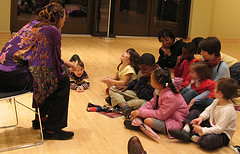
[This is a part of the Fundamentals of Effective Catechesis series.]
So you’re still not planning to use Bible stories in your teaching?
Not convinced it works after the last post in this series on biblical catechesis?
Biblical catechesis was the teaching method of St. Augustine, the apostles and even Jesus himself.
You can’t go wrong following in their footsteps!
However, there’s another reason why biblical catechesis is important. It uses story
and that’s a powerful way to teach.
Here are 4 reasons why biblical catechesis, and teaching from stories in general, should be one of your primary tools–especially for younger students.
1. Bible stories gain attention
Let’s face it, everyone loves a story. As human beings, we’re hard-wired for stories. It’s been the main method of conveying information since the stone age.
Everyone perks up when you tell a story. I’ve been totally bored out of my skull at a lecture, not sure how I was going get through it without falling out of my chair asleep, when the presenter told a story and perked me right up!
If you want to gain your student’s attention, tell them a story.
2. Bible stories are memorable and give meaning
Stories are memorable. In Tell to Win, Peter Gruber describes how narrative story activates the parts of the brain that process meaning.
He says this is important “because humans are meaning-seeking creatures. It’s not just about taking in information. We can’t remember anything without giving meaning to it.”
When we make connections between different pieces of information, we have meaning. Link that with the attention-getting power of stories and you have a powerful combination.
3. The Bible makes connections
The biblical catechesis is perfectly suited to this methodology. Christian revelation is the story of redemption, and our doctrine is drawn from this story. Catholic doctrine is already contained within the story–it just needs to be drawn out.
Additionally, stories are concrete. However, through metaphor and analogy, they allow you to make abstract connections to doctrines and life applications.
One other point on this, the mystery of Christ is all about connections! Much of Catholic doctrine is drawn from the connections between the Old and New Testaments centered in Christ. Biblical catechesis draws the doctrine from these connections and makes it understandable. It perfectly utilizes the power of story!
4. Biblical narratives develop religious feeling
Stories are important for developing true religious feeling.
Stories have the power to move students emotionally. If you want to influence someone and change their point of view, you have to appeal to them emotionally. Marketers say customers buy with their hearts and rationalize that purchase with their minds.
The place of emotion
I know there’s a big bother over the place of emotion in Catholic spirituality and worship.
Emotion is not reliable. Conversions based on emotion might not last.
The problem is when the emotional high lets down, people also doubt their decisions and their religious feeling might go away as well.
Why stories are powerful for the head and the heart
I don’t recommend appealing solely to emotion. But catechesis is a head and heart proposition! You want your students to love Jesus and feel a genuine affection for him. How will you accomplish that? Certainly not with facts and formulas and the details of doctrines, as necessary as they are.
Stories have the power to convey drama. You can communicate the gravity of events, set the mood for what’s happening, immerse your into the biblical world, and help them understand what’s going on.
Things like why it’s so important for Israel to have a Messiah, what slavery is, and why it’s so incredible that Jesus sets us free. Instead of just giving the facts, stories allow you to transmit gut-level, visceral understanding that has power and is memorable.
Catechetical takeaway
Biblical catechesis should be one of your primary catechetical tools. It’s essential not only because it was the primary method of the Church Fathers, the apostles, and Jesus himself. It is a totally effective way to teach–especially for the younger students.
Stories gain and hold attention. They are memorable and appeal to the need for information to be meaningful. Biblical catechesis in particular makes concrete connections with sometimes difficult to understand doctrines. And finally, stories have the power to develop religious sentiment and devotion.
With all this in mind, I think biblical catechesis is an indispensable method to win your student’s hearts for Jesus.
This is part of the Fundamentals of Effective Catechesis series. I’m laying out the basics of the catechetical system I learned at Franciscan University of Steubenville. Check out the other posts!

Where possible, Bible storytelling should support Catholic teaching, e.g., the story of the Prodigal Son is not just about forgiveness, but serves as a model for going to Confession.
Really good point. That’s what I meant by the fact that the Bible itself carries the doctrine latently within it. The doctrine was pretty much formulated as a spiritual reading of biblical record in light of Christ and his teaching. It’s only natural to bring it out using the Bible. And, it makes it more understandable because you’re able to explain abstract concepts using concrete imagery. Obviously, that doesn’t work for every single thing but most things. Particularly in the case of the sacraments.
Amen, Marc! We certainly see this to be true with our boys. Even us though. Dr. Hahn, and his typological approach made the Bible come alive for us and tugged at our heart in ways that called us back to the Church. Where Truth lives, reason and emotion walk together.
That is so true isn’t it? The Catholic Faith just came alive for us when we began to understand it typologically and biblically!
Awesome little saying too! Did you just make that up? That’s quotable! 🙂
Thanks for your enriching article. Could you share to me through email some sample lesson plans of your Biblical catechesis.
Doming Esta
Catechist
Diocese of Malaybalay
Philippines